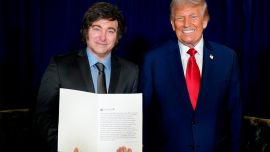A recent abstention by the brand-new Javier Milei government at the General Assembly of the United Nations in the vote on a ceasefire in the war between Hamas and Israel has shifted the position of the previous Alberto Fernández administration six weeks earlier.
Last Monday Argentina took a further step in a similar direction, joining the criticism and condemnation of the Sandinista government in Nicaragua which Fernández had abandoned when he came to power in December 2019.
A first UN resolution of October 27 for a “humanitarian, immediate, lasting and sustained truce leading to a cessation of hostilities” between Hamas and Israel was adopted by 120-14 votes with 45 abstentions. The votes against included Guatemala, Paraguay, Austria, the United States, Hungary and Israel. Argentina voted in favour, as did Bolivia, Brazil, Costa Rica, Cuba, Chile, Colombia, Ecuador, El Salvador, Honduras and Peru.
The second resolution on December 12 was approved by 153-10 votes with 23 abstentions. Its text demanded the “immediate and unconditional release of all the hostages” without condemning Hamas for its attack on Israel on October 7. Along with the United Kingdom, Ukraine, Uruguay and Hungary, Argentina abstained, perhaps as a gesture towards the United States and Israel, who headed the opposing votes, accompanied by Paraguay, Guatemala, Panama, the Czech Republic and Austria. The other countries of the 193 making up the UN General Assembly were in favour except for Venezuela, which did not vote in either of the two resolutions.
It can be recalled that on March 21, 2019, during the Mauricio Macri presidency, Argentina headed within the UN Human Rights Council in Geneva the “group proposing or authors” of a first resolution condemning Nicaragua. Along with Argentina, that group consisted of Brazil, Canada, Chile, Costa Rica, Colombia, Ecuador, Paraguay and Peru.
That resolution was justified by the brutal repression of Nicaragua’s presidential couple Daniel Ortega and Rosario Murillo against the protests against pension cuts as from April, 2018, killing 300 people. When the Office of the UN High Commission for Human Rights in Nicaragua expressed criticism, the Sandinista government expelled the Office’s team from the country in November, 2018. The repression was accentuated, culminating in the closure of 25 universities and the prohibition of 9,338 NGOs while forcing 600,000 Nicaraguans into exile.
This resolution permitted channels of information to be established in Nicaragua via the reports of the UN High Commissioner for Human Rights Michelle Bachelet and her successor Volker Turk, reflected in other subsequent resolutions, all debated in the UN Human Rights Council, including the appointment of independent experts with a mechanism of permanent control of the country in violation and maximum sanctions within the system of the United Nations.
This resolution was promoted by Brazil, Canada, Costa Rica, Chile, Colombia, Peru, Ecuador and Paraguay. However, in 2020, when Alberto Fernández came to power, Argentina pulled out of the monitoring of Nicaragua. The others stayed on despite the left also winning the elections in some of them: Brazil, Chile, Colombia and Peru.
In this respect, Argentina’s speech in Geneva is eloquent because it announced its return to the group of “proposing” countries in the case of Nicaragua, denouncing “arbitrary arrests without guaranteeing the due process of trial such as Bishop Rolando Álvarez, torture and mistreatment in prison.” It underlined the “deportation, arbitrary removal of nationality and the ban on Nicaraguans returning to their country,” as well as “a justice system lacking all independence.”
Finally, Argentina urged the Nicaraguan authorities ”to free all those arbitrarily detained immediately and to restore the rights of the persons deprived of their nationality” while recommending “full cooperation with while permitting the Office of the High Commission, their groups of experts and Treaty organs access to the country so that they can comply with the international obligations of human rights.”
Meanwhile, Milei’s new Foreign Minister Diana Mondino has announced the replacement of nine ambassadors, all career diplomats, who have concluded their terms abroad.
They are: Gustavo Teodoro Grippo, María del Carmen Squeff, María Fernanda Silva, Leonardo Daniel Constantino, Javier Esteban Figueroa, Hugo Javier Gobi, Eduardo Antonio Zuain and Federico Villegas, who in 2022 chaired the UN Human Rights Council in Geneva.




















Comments